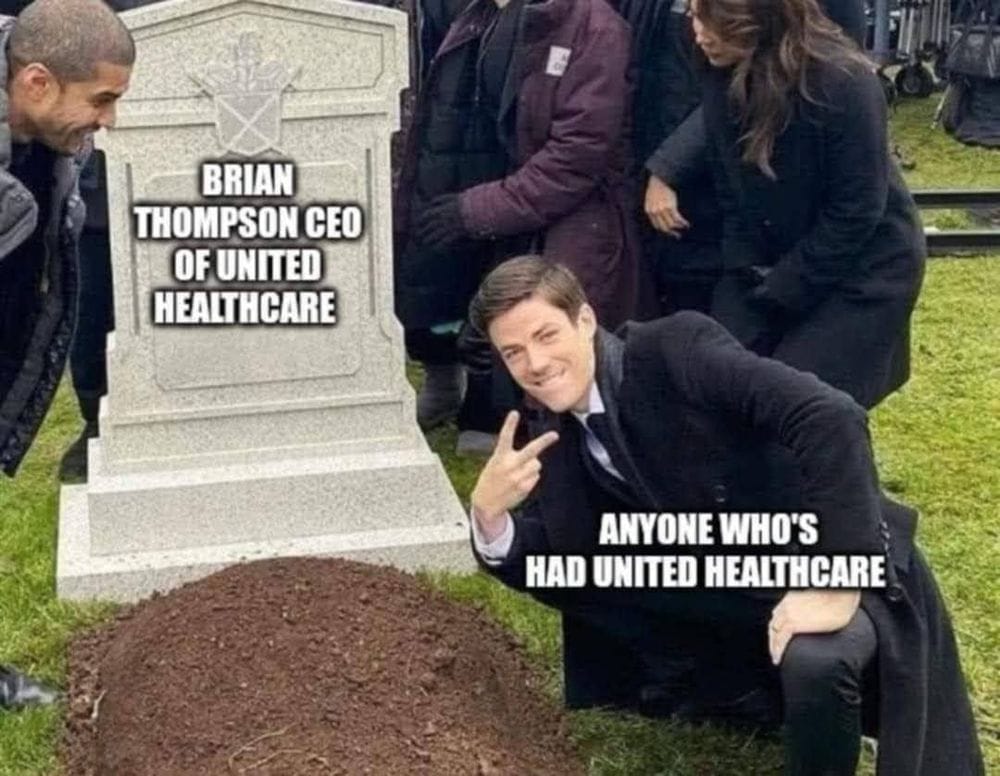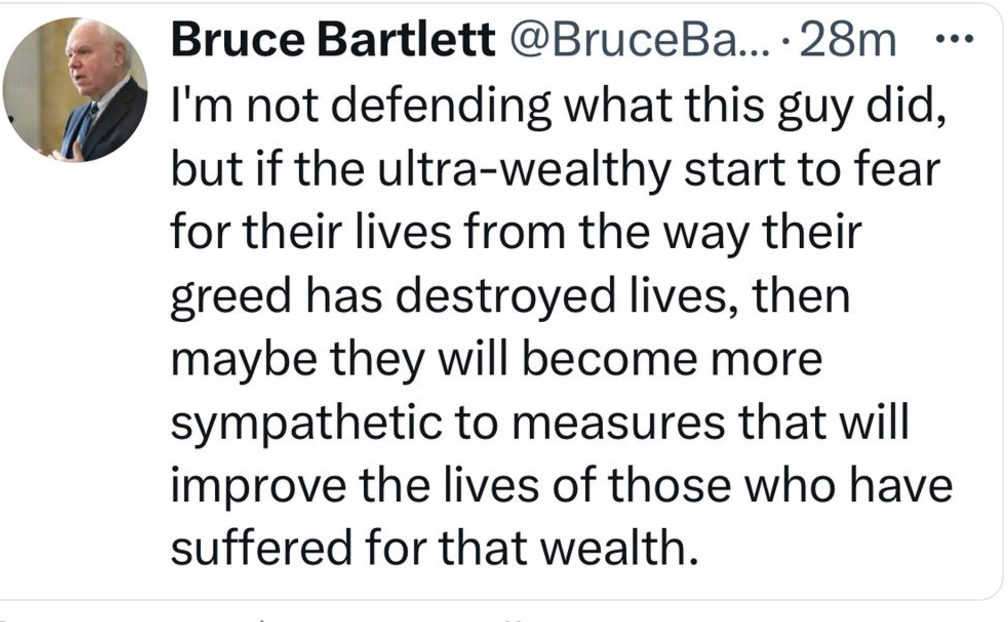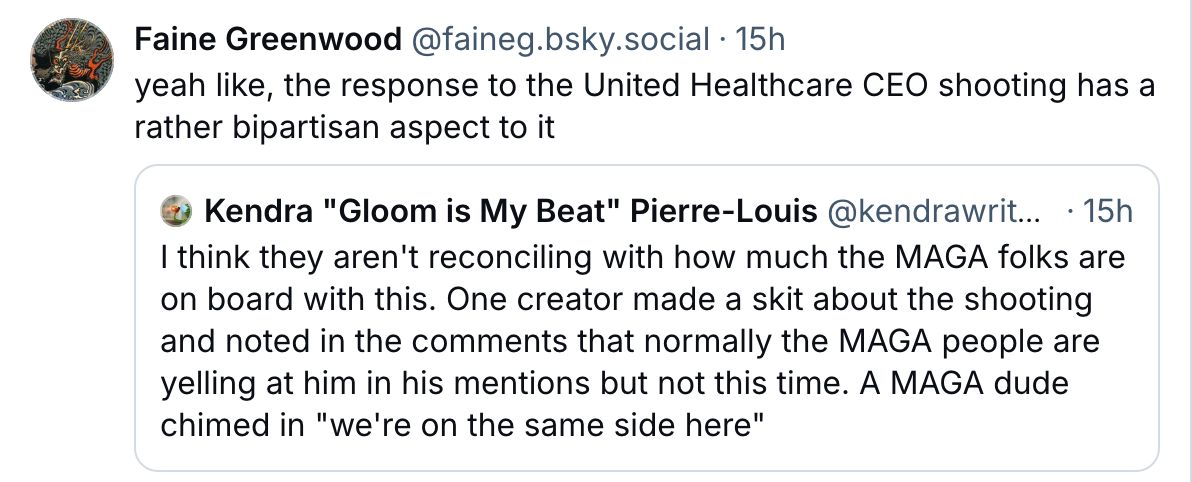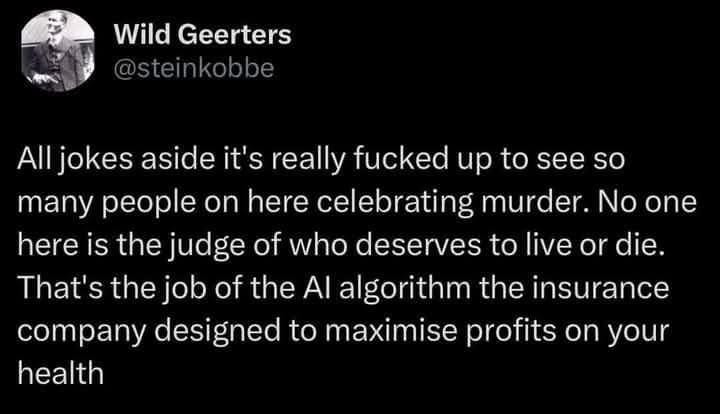Torches, Pitchforks, and Bullets
There haven't been a lot of expressions of sympathy for the murder victim on social media. - from either the left or the right. What irony if the mob-style hit of an exec of a insurance corporation that is widely seen as predatory is the act that brings the nation together.

“Thoughts and deductibles to the family,” read one comment underneath a video of the shooting posted online by CNN. “Unfortunately my condolences are out-of-network.” On TikTok, one user wrote, “I’m an ER nurse and the things I’ve seen dying patients get denied for by insurance makes me physically sick. I just can’t feel sympathy for him because of all of those patients and their families.” - NY Times
This week the United Healthcare CEO, Brian Thompson, was gunned down, mob-hit style, on the streets of New York City. United Healthcare provides (or denies) health insurance for nearly 50 million Americans. Thompson’s salary was around $10 million per year, according to the Daily Mail. Other outlets reported that he also exercised more than $20 million worth of stock units in early 2024. His net worth was close to $43 million, as reported by Daily Beast and WallMine.
Police say that the words “deny,” “defend,” and “depose” were written on bullet casings found at the scene. These words are often used in describing allegations leveled at insurers who avoid paying claims, the Associated Press reported Thursday. The words were also popularized in a book with a similar title: “Delay Deny Defend: Why Insurance Companies Don't Pay Claims and What You Can Do About It,” published in 2010. The book claims to be “an expose of insurance injustice and a plan for consumers and lawmakers to fight back.” It was written by Jay Feinman, an expert in insurance law and professor emeritus at Rutgers University who set out to show companies denying valid claims was “the result of an increasing and systematic focus on maximizing profits by major companies.
Earlier in the week, it was reported that Anthem Blue Cross Blue Shield plans in Connecticut, New York and Missouri declared it would no longer pay for anesthesia care if a surgery goes past an arbitrary time limit, regardless of how long the surgical procedure takes. Patients and Dr.s were furious. "The American Society of Anesthesiologists (ASA) initially sent a letter to Anthem protesting the policy in November, calling it a “cynical money grab” and urging Anthem to reverse it immediately."
Bowing to pressure, Anthem announced that it had all been a misunderstanding, (well of course it was!) And their priority is always patient care.
“There has been significant widespread misinformation about an update to our anesthesia policy. As a result, we have decided to not proceed with this policy change,” the company said in a statement. This policy reversal came within 24 hours of United Healthcare's CEO's murder. Coincidence, much?

When my wife and I got married, she was working for an insurance company in the claims dept. She was a way up the ladder as far as the "appeals" process works. If you'd been denied a claim once or twice, she was the last chance. At that final stage, most of the claims were approved... you see, the company wanted you to jump through a few hoops before you were given money that was contractually yours. The hope was that you would give up by then, or you know, just die. It was a great strategy... depending on the insurance company, between 17 and 50% of claims are denied, and only .2% of denied claims are appealed. Some of these, no doubt, are for cause. Still, it's a pretty nice return for just saying "no." (My wife left that job as soon as she could, it was a misery-making experience.)
In response to Thompson's murder, something interesting has happened, or rather hasn't happened. I have seen only one completely sincere, compassionate, unqualified expression of sympathy for the victim on social media. On both right and left-wing social media sites, commenters are disparaging the memory of the executive if not actually cheering the assassination. Even the scolds that expressed shock and outrage over the attempted assassinations of President Trump were all, "Well, I can understand this one."
What extreme irony if the mob-style hit of an executive at a corporation that is widely seen as predatory, is the act that brings the nation together.








The angry reactions may have united the country.
On various social media platforms, there were links to a piece written a decade ago by Nick Hanauer, heir to the Hanauer bedding fortune and an entrepreneur/industrialist in his own right. He titled his article "The Pitchforks Are Coming… For Us Plutocrats", and addressed it to his "fellow zillionaires..."
I was a mediocre student. I’m not technical at all—I can’t write a word of code. What sets me apart, I think, is a tolerance for risk and an intuition about what will happen in the future. Seeing where things are headed is the essence of entrepreneurship. And what do I see in our future now?
I see pitchforks.
At the same time that people like you and me are thriving beyond the dreams of any plutocrats in history, the rest of the country—the 99.99 percent—is lagging far behind. The divide between the haves and have-nots is getting worse really, really fast. In 1980, the top 1 percent controlled about 8 percent of U.S. national income. The bottom 50 percent shared about 18 percent. Today the top 1 percent share about 20 percent; the bottom 50 percent, just 12 percent. -Nick Hanauer
That figure is higher today: the top 1% now control about 27% of the nation's wealth. And the bottom 25%? Families in the bottom 25% of wealth had a net worth of less than $178,600. On average, they had $74,200. Of that cohort, 23%—or 8% of the overall population—had a negative net worth where their debt exceeded their marketable wealth. Of all people, JPMorgan CEO Jamie Dimon said the American dream is disappearing. In an opinion piece for the Washington Post, he wrote: “The American dream is disappearing for many because opportunity is not shared equally.” Jamie sees pitchforks on the horizon.
Again, from Hanauer-
The oldest and most important conflict in human societies is the battle over the concentration of wealth and power. The folks like us at the top have always told those at the bottom that our respective positions are righteous and good for all. Historically, we called that divine right. Today we have trickle-down economics.
What nonsense this is. Am I really such a superior person? Do I belong at the center of the moral as well as economic universe? Do you?
Researchers, academics, and scientists predicted climate change decades ago. The hurricanes and fires are here. Similarly, economists, political scientists, and historians have warned us for years how destabilizing a massive wealth gap will be. The anger is building and the torches are being lit.
"...societies, organized as states, can experience significant periods of peace and stability lasting, roughly, a century or so. Inevitably, though, they then enter periods of social unrest and political breakdown. Think of the end of the Roman Empire, the English Civil War or the Russian Revolution." --Peter Turchin of The Guardian
The political parties have been upended. After a previous Gilded Age ended in a total economic collapse known as the Great Depression, Democrats led by FDR ushered in the New Deal. It brought back the idea that a strong government is necessary to balance the interests of the people and the "owners." Monopolies were busted up. Labor unions gave workers a voice and a seat at the bargaining table (and a slice of the pie.) A strong social safety net was established.
The Republican 1% and their money still had great power, but the wealth gap shrunk, building a solid middle class. More people had a shot at getting into at least the top 10%... getting good educations, building small businesses, and gaining positions of leadership.
But starting in about the 70s, things began to unravel. Republicans were able to slash taxes for the wealthy at the same time that they dismantled unions and put downward pressure on wages. Regulations that protected the middle class were rolled back. Wages stagnated and as income flowed to the top, they couldn't even keep up with inflation. Life expectancies dropped, health care morphed into a corporate profit center that became unaffordable for many. Republicans built a communications empire that sounded a constant drumbeat that the fault was that of immigrants, the poor, and Democrats. Traditional blue-collar and rural Democrats migrated to that populist message and began to distrust their own leadership. Traditional Chamber of Commerce Republicans and "values-based" Republicans mostly chose to cling to the new power center that often had nothing to do with their previous principles.
The wealth that trickled to the top, is now a firehose. Even when Democrats could win elections, they were viewed as part of the problem... the working class was underwater.
And then Trump poured gas on the fire.
The main point here is that in 2024, the Democrats, having morphed into the party of the ruling class, had to contend not only with the tide of popular discontent but also a revolt of the counter-elites. As such, it finds itself in a predicament that has recurred thousands of times in human history, and there are two ways things play out from here.
One is with the overthrow of established elites, as happened in the French and Russian Revolutions. The other is with the ruling elites backing a rebalancing of the social system – most importantly, shutting down the wealth pump and reversing popular immiseration and elite overproduction. It happened about a century ago with the New Deal... But the US has so far failed to learn the historical lessons.
-Peter Turchin of The Guardian. Author of End Times: Elites, Counter-Elites and the Path of Political Disintegration

Revolution or a Rebalance?
The brazen murder of an insurance executive is not a good sign of what may come. And it doesn't, at this point, sound like a "rebalance" is on its way. My friend who admonished those who joked about or even applauded Brian Thompson's death, was quick to say that there are appeals available for those denied an insurance claim. And that a human was killed, leaving a wife and children. He is of course, correct. And in a society already torn by violence, this further erodes our ability to solve anything.
I dunno. So many have tried appeals. They've tried to wade through a senseless corporate bureaucracy to get care for themselves or their families. It is care that they have paid for with a huge portion of their paycheck. When someone dies or remains untreated due to (what's perceived as) a predatory industry, that's a life lost, too. People feel unheard and victimized.
Multi-millionaires and billionaires control our lives. They dictate what can be taught in our schools. What medical care we receive. What jobs we have and for how long. And importantly, how much we get paid.
There are so many billionaires nowadays, that they are themselves waging battles for their status and place in the hierarchy. Elon Musk and Jeff Bezos are in a personal space race to Mars, spending mountains of capital that maybe could provide healthcare for millions? Trump has proposed a cabinet that is stacked almost to a person with billionaires. Whose interests do you think they'll have when it comes to directing public policy?
Again, from Nick Hanauer, "The Pitchforks Are Coming… For Us Plutocrats" published ten years ago:
And so I have a message for my fellow filthy rich, for all of us who live in our gated bubble worlds: Wake up, people. It won’t last.
If we don’t do something to fix the glaring inequities in this economy, the pitchforks are going to come for us. No society can sustain this kind of rising inequality. In fact, there is no example in human history where wealth accumulated like this and the pitchforks didn’t eventually come out.
You show me a highly unequal society, and I will show you a police state. Or an uprising. There are no counterexamples. None. It’s not if, it’s when.
Word to Nick and his plutocrat pals: It's now.
